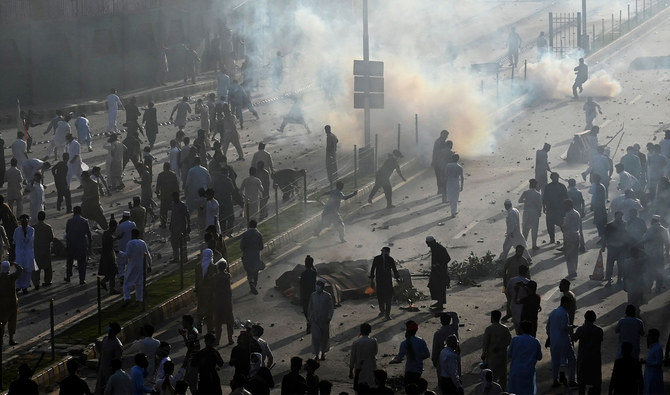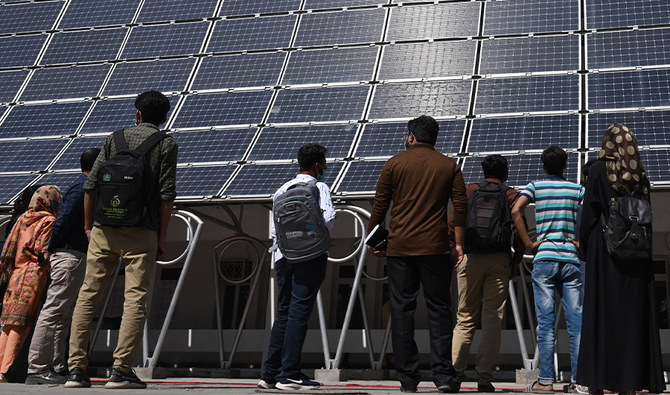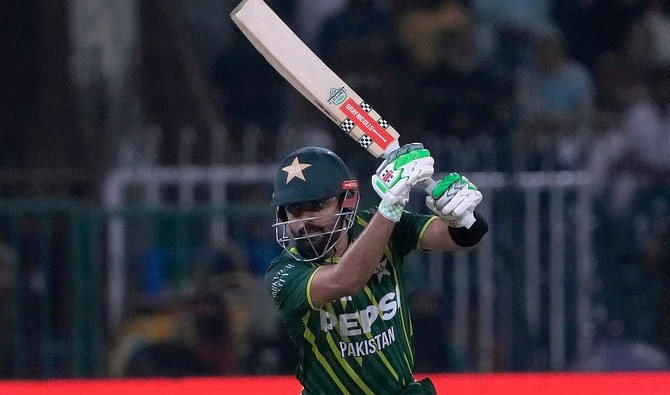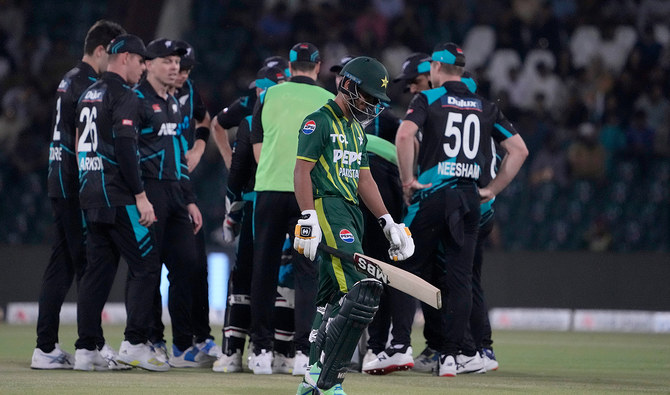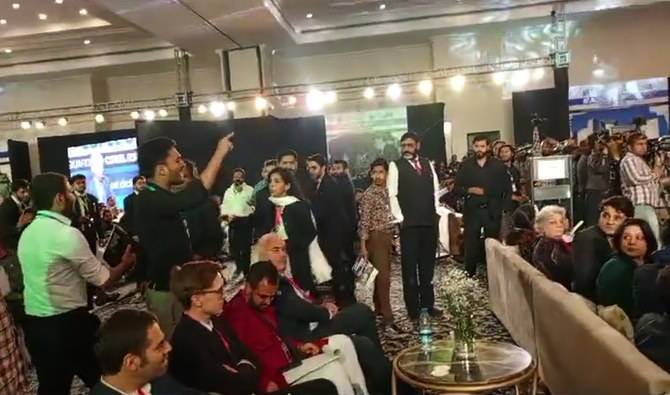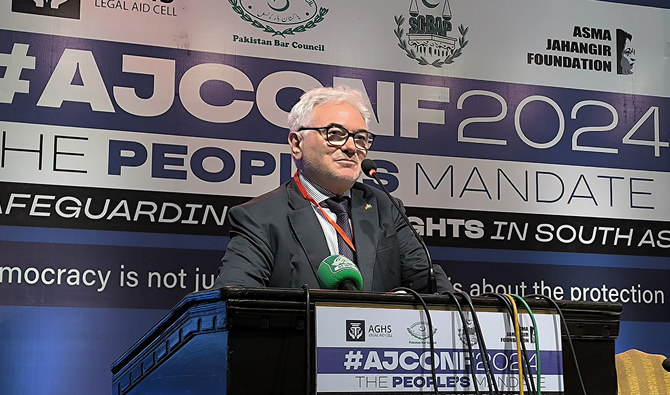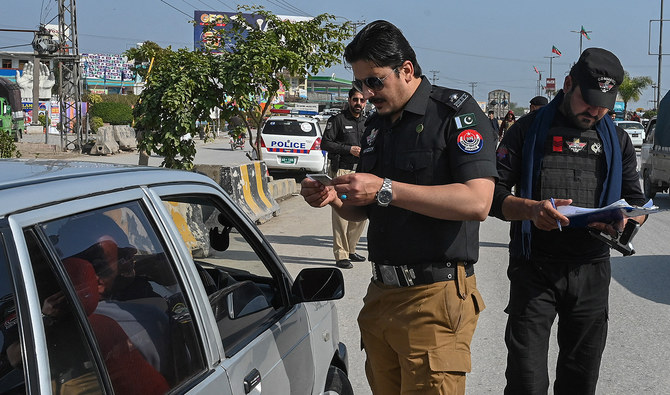KARACHI/PESHAWAR/QUETTA: Former Prime Minister Imran Khan was arrested in Islamabad by the paramilitary Rangers force on Tuesday, triggering nationwide protests in which at least one person was killed in the southwestern city of Quetta, according to a hospital spokesperson.
The protests have threatened fresh turmoil in the South Asian nation as it faces its most daunting economic crisis to date, with record high inflation, anemic growth and barely enough foreign exchange reserves for four weeks of controlled imports.
Khan had arrived in the capital city from Lahore and was inside the premises of the Islamabad High Court (IHC) for two hearings on Tuesday afternoon when he was arrested in a separate case, the Al-Qadir Trust reference pending before an anti-graft court and relating to the purchase and transfer of land for a university in the Punjab province.
The arrest by paramilitary Rangers officials, who reportedly had warrants, took place a little after 2pm on Tuesday afternoon when Khan entered the building of the IHC. Media reported that dozens of paramilitary troops in riot-gear had to break several doors, jump through smashed windows and scuffle with Khan’s supporters and lawyers before arresting him and driving off with him in a black Vigo.
“I’m mentally ready to be arrested,” Khan had said in a video message to supporters before he left Lahore for Islamabad.
Khan will be presented before a National Accountability Court tomorrow, Wednesday. His medical examination, usual for suspects after arrests, was carried out on Tuesday.
NAB in a statement said Khan was booked under Section 9A of the National Accountability Ordinance 1999, which relates to “corruption and corrupt practices.”
"The arrest was ordered and implemented by the NAB," the accountability watchdog said. "Rangers troops were deployed for the action on the orders of the Ministry of the Interior."
Authorities in three of Pakistan's four provinces imposed an emergency order banning all gatherings as Khan's supporters clashed with police, blocked major roads in a string of cities and reportedly stormed military buildings in Lahore and Rawalpindi, according to witnesses and videos shared by Khan’s party. Arab News could not independently verify this, and the army did not respond to messages seeking comment.
Previous attempts to arrest Khan from his Lahore residence resulted in heavy clashes between his supporters and law enforcement personnel earlier this year.
Khan's arrest comes on the heels of the army’s warning about legal action over accusations by Khan that a serving military official, Maj Gen Faisal Naseer, was plotting to kill him.
Just hours before his arrest, Khan doubled down on the allegations in a video message.
On Tuesday night, the Islamabad High Court ruled in a much-awaited order that Khan’s arrest was legal, dashing the hopes of his party and supporters that he would be released.
PROTESTS
Soon after Khan’s arrest, his supporters poured into the streets across Pakistan, blocking main roads, disrupting traffic and chanting anti-government slogans. The PTI said one supporter was killed in the southwestern city of Quetta, but police did not confirm the killing.

Pakistan Tehreek-e-Insaf (PTI) supporters are seen protesting against the arrest of former Pakistan's Prime Minister Imran in Quetta, Pakistan, on May 9, 2023. (AN photo)
“You will have to come out for real independence,” Khan’s Pakistan Tehreek-e-Insaf said on Twitter in a protest call to supporters. “The time has come that you will have to come out [on the streets] for the sake of your country.”
Quetta
A spokesman for Quetta Civil Hospital, Waseem Baig, said one dead body and six injured people were brought to the hospital after a protest broke out on Quetta's Askari Chowk.
Protests first broke out on Airport Road in Quetta, the capital of Pakistan's southwestern Balochistan province, where scores of PTI supporters had gathered to demand Khan's release. Airport road connects Quetta with Chaman and other districts in the province.
PTI's senior leader in Balochistan, Abdul Bari Barrech, said the party would hold protests in all districts of the province and keep blocking major highways until Khan was released.
"We are on the street not for Imran Khan or PTI but for Pakistan and we request all Pakistanis to come out for the better future of their children," Barrech told Arab News.
PTI's provincial spokesperson Asif Tareen said one protester had been shot dead by police but Deputy Inspector General of Police Asfar Mehsar told Arab News police did not use weapons against protesters. He said over a dozen protesters had been arrested.
Lahore
In the city of Lahore, where Khan has been based since he was injured in an apparent assassination bid last year and where he grew up, supporters gathered outside his residence in the Zaman Park neighbourhood and there were reports of several rounds of clashes with police.
Supporters also gathered at Lahore's Liberty Chowk area where the party has held several large rallies over the past year.
An Arab News witness in Lahore reported that supporters pelted stones at police on Canal Road, Liberty, Cantt and near the military Corps Commander House. Police opened tear gas in response. Major roads in the city were blocked.
A PTI post on Twitter showed scenes from the streets of Lahore:
Media reported party supporters had closed down Akbar Chowk, Peco Road, Main Canal Road and Faisal Town in Lahore. The demonstrators burnt tyres and chanted slogans against the coalition government.
A statement issued by Lahore police said the city was on high alert and security across the city had been beefed up on the instructions of Lahore Deputy Inspector General (Operations) Syed Ali Nasir Rizvi.
“Nobody can be allowed to destroy peace in the city,” the statement quoted Rizvi as saying.
Karachi
Scores of Khan supporters also took to the streets in Pakistan's most populous city of Karachi, the country’s commercial hub, blocking the city's busiest main road, Shahrah-e-Faisal, which leads to the airport.
Police used tear gas shelling to push back supporters and get the road opened. There were reports of clashes between police and protesters in other parts of the city also.
Meanwhile, the PTI's Sindh spokesperson said PTI Sindh President Ali Haider Zaidi, a close Khan aide and popular leader in Karachi, had been arrested, along with around 20 other supporters.
Peshawar
In the northwestern province of Khyber Pakhtunkhwa, former federal minister and Khan aide, Zartaj Gul Wazir, led a group of supporters in Ghazi Ghat city, blocking traffic.
Scores of angry Khan supporters chanting slogans against the government also took to the streets in the provincial capital of Peshawar, where Khan’s party held power from 2013 until earlier this year. There were reports protesters pelted police with stones near Assembly Chowk, with police retaliating with tear gas shelling to disperse demonstrators.

Paramilitary soldiers from Frontier Corps stand guard outside their headquarters, where supporters of Pakistan's former Prime Minister Imran Khan protest against the arrest of their leader, in Peshawar, Pakistan, on May 9, 2023. (AP)
PTI protesters also tried to enter the city’s Cantt area where important military and government buildings and residences are housed, but were blocked by police from doing so.
"Peshawar is taking to the streets. Today, you need to decide where you stand. Whatever city you're in, get out," Taimur Khan Jhagra, a prominent leader of the PTI from Khyber Pakhtunkhwa, wrote on Twitter.
Islamabad/Rawalpindi
A large number of PTI supporters also gathered at Faizabad, the busiest connecting point between the twin cities of Islamabad and Rawalpindi. There are reports of a massive traffic jam on the Srinagar Highway in the capital, Islamabad.
There were unconfirmed reports that protesters had gathered outside the military’s GHQ headquarters in Rawalpindi.
Gilgit-Baltistan
Khan supporters also took to the streets in the northern Gilgit-Baltistan region, especially the Ghanche district, barricading a road in Khaplu Bazaar and burning tires.
ECONOMIC CRISIS
Since being ousted from power in a parliamentary no-trust vote last April, over 100 cases have been registered against Khan in various courts in the country, with charges ranging from corruption to terrorism and sedition.
Khan says the cases are politically motivated to crack down on his Pakistan Tehreek-e-Insaf, arguably the most popular political party in the country. In recent months, many senior Khan aides have had cases registered against them and been arrested.
The fresh political crisis comes as Pakistan and the IMF are in ongoing talks aimed to resume stalled funding of $1.1 billion due in November from a $6.5-billion program agreed in 2019. The measures have fueled highest ever inflation, posted at 36.4% in April.
The IMF funding is crucial for Pakistan to avert default on its external payment obligations during a balance of payment crisis.
After Khan’s arrest the Pakistan Stock plunged 455 points, equity analysts said, nosediving by over one percent to close at 41,373.
“There were already a couple of things going on, including on the International Monetary Fund (IMF) front and that financing gap still prevails and they [IMF] are asking for a further interest rate hike so that sentiment was negative since yesterday,” Tahir Abbas, head of Research at Arif Habib Limited, told Arab News.
“After the arrest of Imran Khan, the market nosedived ... The move has further increased political uncertainty.”
Ahsan Mehanti, a senior equity analyst, said protests after the arrest of Imran Khan had also contributed to the downfall of the stocks.
“Stocks fell sharply amid political uncertainty after the arrest of the PTI chief and unrest in Karachi,” he said.
With inputs from Haseeb Asif in Lahore, Fatimah Amjad and Aamir Saeed in Islamabad, Khurshid Ahmed in Karachi and Nisar Ali in Ghanche, Gilgit-Baltistan.



